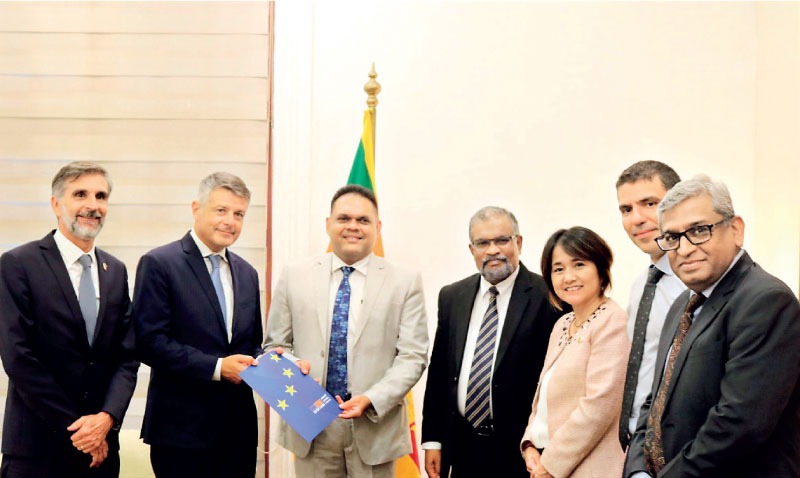Wednesday Feb 25, 2026
Wednesday Feb 25, 2026
Thursday, 20 July 2023 03:27 - - {{hitsCtrl.values.hits}}

The Government of Sri Lanka and the World Bank, European Union (EU) and Agence Française de Development (AFD) have recently signed financing agreements to help strengthen Sri Lanka’s management of public finances.
The grant of EUR 9.8 million for Public Finance Management aims to support improving economic governance, transparency, and accountability in how public finances are spent.
“Weak management of public finances contributed to Sri Lanka’s economic crisis, so it is crucial to strengthen core public finance institutions and systems to shore up the economic recovery and get the country on a sustainable growth path,” said World Bank Country Manager for Maldives, and Sri Lanka Chiyo Kanda.
“This project will leverage technology to develop and scale up the government’s nascent e-procurement system (e-GP) and enhance the institutional capacity of the National Audit Office of Sri Lanka, both important steps towards enhancing efficiency and transparency in public procurement and external audits.”
The public sector is the largest purchaser of goods, works, and non-consulting services in Sri Lanka’s domestic market. Procurement of these goods and services is often delayed due to cumbersome and outdated procedures and processes, limited understanding of market approaches, and lack of capacity and empowerment of procurement decision-makers.
“In the absence of digitised procurement tools and an efficient e-procurement system, Sri Lanka misses out on opportunities to leverage economies of scale and to monitor the efficiency and timeliness of procurement,” said European Union Sri Lanka and Maldives Ambassador Denis Chaibi. “A strong and modernised public finance management system is vital for the country to mitigate the risk of crises in the future and to establish accountability and public trust in the system. The European Union—through the World Bank—is pleased to support institutional capacity and transparency in Sri Lanka’s procurement and audit, which will improve economic governance and aid Sri Lanka’s recovery.”
The project aims to strengthen the overall accountability framework by improving the performance of the National Audit Office of Sri Lanka in terms of stronger governance, greater accountability, and enhanced institutional capacity in areas relating to audit planning, quality assurance, staff capacity, engagement of citizens in the audit process, as well as in specialised audits such as procurement and environment audits.
The project is aligned with the new World Bank Group Country Partnership Framework (CPF) FY24-FY27 for Sri Lanka. The CPF focuses on restoring economic stability and building a stronger foundation for green, resilient, and inclusive development. The project’s focus on supporting economic governance and institutional strengthening is aligned with the CPF’s goals and will support the Government of Sri Lanka’s governance reforms.
The grant of EUR 9.8 million for the Public Finance Management reforms is provided through a multi-donor trust fund that is financed by the EU and AFD and administered by the World Bank.
The World Bank Group CPF, lays out a two-phased approach that starts with a focus on urgent macro-fiscal and structural reforms and support to protect the human capital and most vulnerable population. After the first 18-24 months, and subject to successful implementation of the reform program and international debt relief and financial support, the CPF focus will gradually shift to investments in longer-term development needs that will help promote private sector job creation—particularly for women and youth—and boost resilience to climate and external shocks. To prepare the CPF, the World Bank Group held extensive countrywide and online consultations with key stakeholder groups, including the government, the private sector, civil society, think tanks, academia, media, and other development partners.